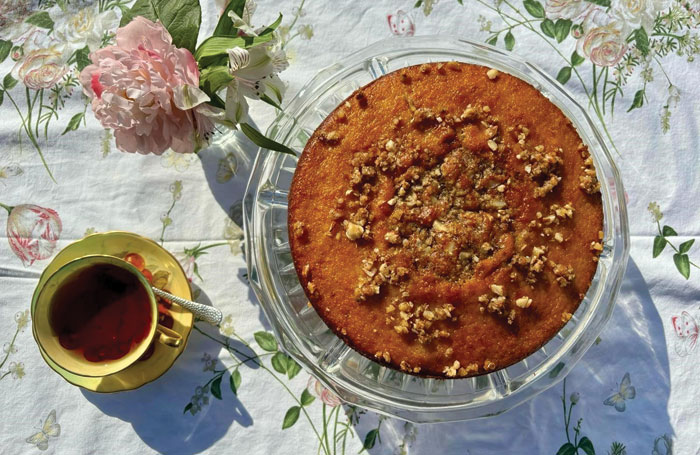 Photo by Sephardic Spice Girls
Photo by Sephardic Spice Girls My quintessential memory of my grandmother Nana Aziza is of sharing a cup of tea with her. Tea was a ritual for her and she always brewed a perfect cup. Of course, she called it “chai,” the Arabic word for tea. Her tea was a strong blend of black tea, a generous dash of freshly ground cardamom and a bunch of fresh mint. She always served tea with one of her freshly baked Iraqi pastries, which might be baba tamar (date cookies), cheese sambusak, crispy sweet almond sambusak (flavored with cardamom) or crispy, salty ka’ak (flaky ring cookies).
To sit with her and drink a cup of her tea was to be embraced in a special circle of love. When Alan was lucky enough to meet me and smart enough to marry me, he too was initiated into this tea ritual. I will never forget him asking me “Why does your grandmother’s tea taste so good?”
I’m pretty sure the answer was cardamom, a unique pod that originated in Asia. When ground into a spice, cardamom imparts a uniquely piney, menthol, eucalyptus and floral flavor.
Alan invested a lot of time trying to replicate her amazing tea at our house. And to be honest, he got pretty close.
I love when my non-Hebrew speaking husband asks me “Rotzah tay?”
For centuries, cardamom has been valued for its medicinal qualities. It is full of antioxidants and is thought to aid in digestion and regulation of blood sugar. It is also a diuretic, which can help to lower blood pressure.
Regardless, my Nana’s cardamom tea was a magic elixir.
I still keep a big jar of cardamom pods in my freezer, ready to grind into a pot of tea or into my t’bit (Iraqi chicken and rice dish) or a tray of crispy baklava.
—Sharon
One of our most important missions as the Sephardic Spice Girls is the recording and preservation of our mother’s and grandmother’s recipes. It’s been a challenge, because they lived in a time when everything was transmitted through hands-on experience in the kitchen. Nothing was ever really written down or documented.
When you try to make a recipe from your family history, it may not be exactly like your grandmother’s but you’ve kept it alive. It will, G-d willing, stay alive with your children and grandchildren. You have given them a piece of your legacy.
Thankfully, there is now so much more awareness of Middle Eastern and Sephardic cuisine. But it’s never quite the same as the way your mom made it. When Sharon and I decide we want to make something, we do a lot of digging and asking before we bring the recipe to you. Ultimately, we put our own twist on a recipe from the past. When you try to make a recipe from your family history, it may not be exactly like your grandmother’s but you’ve kept it alive. It will, G-d willing, stay alive with your children and grandchildren. You have given them a piece of your legacy.
That is one of the reasons our community cooking and baking classes are so important to us. We love empowering women (and men) to get their hands dirty, learning traditional Sephardic recipes. Recipes that connect them to our shared roots and culture.
If you’ve eaten lunch in the hood, you’ve probably tasted the fresh, fluffy challah or amazing desserts baked by our good friend Mickey Kahtan of @mickeybakes. We’ve known Mickey for a long time (her father even knew Sharon’s grandfather Aba Naji in Baghdad). She and her extended family have been an integral part of the Sephardic Educational Center for many, many years.
We’re thrilled that she’ll be sharing her baking expertise at our upcoming Master Bake Class at Kahal Joseph Congregation in Westwood on March 18th. You’ll be taking home some Iraqi delicacies that work for Purim and Pesach, as well as deliciously crispy biscochos.
We truly hope you’ll join us and create new baking traditions for your family.
—Rachel
Growing up in a traditional Iraqi Jewish home, my mom always took extra joy in making special desserts for Shabbat, Jewish holidays and family celebrations. One of her specialties is bak’lawa (baklava). Made with ground almonds, crispy layers of phyllo dough and delicious shira (sweet sugar syrup), baklava is the definition of a celebratory food in the Baghdadi kitchen. I have always enjoyed making this treat with my mom and am blessed to continue making it with her.
My mother’s bak’lawa is made with lots of cardamom and rose water. These are two of my favorite ingredients and I love using them in my baking.
In 2018, when I started my baking business, I wanted to create an easy to make dessert that is infused with these unique flavors. I came up with this delicious Bak’lawa Cake, a perfect marriage of Middle East meets American pound cake.
This is my go to recipe when I’m in the mood for a yummy cake to share with family and friends with a refreshing cup of hot tea. A cake with the authentic Iraqi flavors that will always remind me of home.
—Mickey Kahtan
@MickeyBakes
Bak’lawa Cake
Nut Blend
1 cup of coarsely ground almonds and walnuts
1/2 cup sugar
1 Tbsp finely ground cardamom or cinnamon
3 large eggs, at room temperature
1 cup sugar
3/4 cup avocado or vegetable oil
1 1/2 cups all purpose flour
1 Tbsp baking powder
3/4 cup water or milk
Preheat oven to 350°F.
Grease a 9-inch round cake tin
Beat the eggs and sugar until the mixture is a pale yellow and creamy. Add the oil and beat well.
Fold in the flour and baking powder.
Stir in the water or milk until batter is uniform.
Pour half the batter into the cake tin, then sprinkle one half of the nut mixture on top.
Pour remaining batter over the nut mixture.
Sprinkle the rest of the nut mixture on top of the cake.
Bake for 45 minutes, until cake is golden brown.
Rachel Sheff and Sharon Gomperts have been friends since high school. They love cooking and sharing recipes. They have collaborated on Sephardic Educational Center projects and community cooking classes. Follow them on Instagram @sephardicspicegirls and on Facebook at Sephardic Spice SEC Food.























 More news and opinions than at a Shabbat dinner, right in your inbox.
More news and opinions than at a Shabbat dinner, right in your inbox.